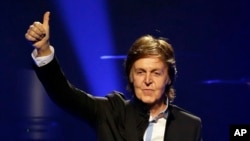Former Beatle Paul McCartney sued Sony's music publishing arm Wednesday in federal court in New York, seeking to get back the copyrights to music of his former band, court records show.
Starting in October 2008, McCartney sent notices to Sony/ATV Music Publishing stating his desire to reclaim the copyrights to numerous songs, including Beatles hits "Across the Universe," "Love Me Do" and "I Want to Hold Your Hand," the suit said.
Sony/ATV holds copyrights to the works, which were jointly composed by McCartney and John Lennon between September 1962 and June 1971. The suit said the singer-songwriter would be able to begin to reclaim his rights to the music as of next October under the U.S. Copyright Act.
McCartney's lawyers have repeatedly asked Sony/ATV to acknowledge the musician's rights to terminate copyright transfers of the music, and the company has declined to do so, the suit said.
"Because the earliest of Paul McCartney's terminations will take effect in 2018, a judicial declaration is necessary and appropriate at this time so that Paul McCartney can rely on quiet, unclouded title to his rights," the suit said.
'Premature' lawsuit
Sony/ATV Music Publishing was critical of the lawsuit in an emailed statement.
"Sony/ATV has the highest respect for Sir Paul McCartney with whom we have enjoyed a long and mutually rewarding relationship with respect to the treasured Lennon & McCartney song catalog," Sony/ATV said. "We are disappointed that they have filed this lawsuit, which we believe is both unnecessary and premature."
The lawsuit said Sony/ATV attempted to stall talks with McCartney until the conclusion of a lawsuit involving similar claims by British pop band Duran Duran that was playing out in an English court. Duran Duran lost the legal battle to a Sony/ATV subsidiary in December.
"Rather than provide clear assurances to Paul McCartney that defendants will not challenge his exercise of his termination rights, defendants are clearly reserving their rights pending the final outcome of the Duran Duran litigation," McCartney's lawsuit said.
The suit is seeking a declaration from the court that McCartney can reclaim his copyright interests in the songs, as well as attorneys' fees.





